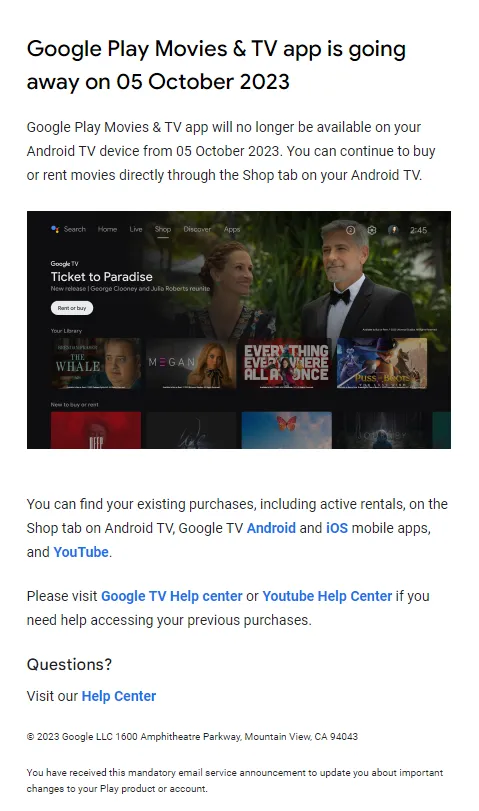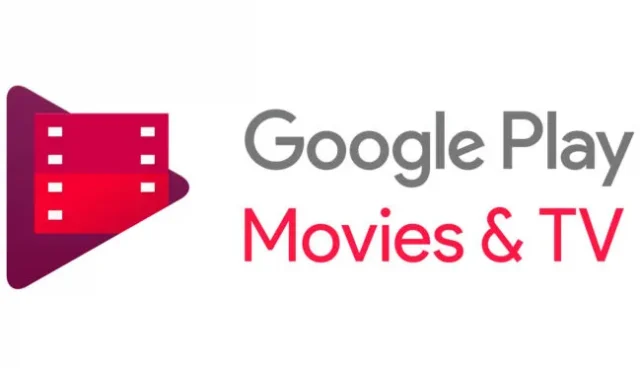Google is killing off the last vestiges of Google Play Movies & TV, a service that sold premium Hollywood films and TV shows as part of Google’s once-cohesive string of Google Play content stores. The company emailed users of Android TV to say that the “Google Play Movies & TV app will no longer be available on your Android TV device from 05 October 2023. You can continue to buy or rent movies directly through the Shop tab on your Android TV.”
Play Movies has been going through a slow death as Google shuffles around its media content. The smartphone Play Movies app became “Google TV“in 2022, and that same year, the Play Store app was stripped of movie and TV sales. On third-party smart TVs (this is a different category than today’s Android TV announcement) the app was killed in 2021. On Android TV, the new “Shop”tab seems to just be an OS-integrated Google TV content store.
If you think this sounds confusing, you’re not alone. Google’s support page reflects the ridiculous state of Google’s video apps, instructing users that “in Your Library, you can find content that you bought from: Google Play Movies & TV, YouTube, Android TV, Google TV.”How any normal person is supposed to understand that pile of Google media brands, and how it works across phones, the web, and various smart TV OSes, is beyond me.

Google Play was once a media empire at Google, with the Google Play Store (for Android apps and games), Play Music, Play Books, Play Newsstand, and Play Movies and TV. The idea back in the 2010s was to compete with the digital media revolution Apple created with iTunes, the iPod, and the iPhone. iTunes had all the content people could want, and Android needed a similar setup, so a ton of content stores were launched by Andy Rubin’s Android team. Most of the media stores started in the Android Market but then pivoted to a more Google-wide offering with the launch of Google Play branding in 2012.
At the peak of its powers, the Play Store had tabs for apps, music, books, magazines, movies & TV, and a “devices”hardware store, all in a single interface. Back then, Google Play felt like a cohesive platform and a top-tier ecosystem. Nothing at Google is ever stable, though, and the company’s other media stakeholders sought to pick apart what the Android Team had built. The Google Store took over hardware duties from the Play Devices section in 2015. Magazines shut down in 2018 and was replaced by Google News, and after two years, Google News gave up on the idea of selling content. Play Music was shut down in 2020, and users were pushed to YouTube Music, which, even after the miserable transition, is still an all-around inferior product. Hollywood content is now split between YouTube (which offers à la carte movie purchases), Google TV (which is both Google’s TV operating system and an Android app), and a still-surviving “Movies & TV”section that is only on the web Play Store. The one Google Play child no one seems to want is Play Books, which is still awkwardly surviving as the lone content store in the Play Store app.
While there is still that Play Store web section, I guess it’s time to call it for the Google Play Movies & TV brand. All the apps will be dead in October, and presumably, that means the now-useless store will be booted from the web interface as well. Everyone wants to get this video content on their smart TVs now, and smart TV vendors get to pick and choose what apps they pre-load. That makes standalone “me too”Google apps like Play Movies a tough sell, but Google has a video app all the vendors want: YouTube. During a carriage dispute with Roku, Google figured out that packing all its video content into a single YouTube app would ensure that all of its video content would be carried by every smart TV vendor. It built YouTube TV—the $73-a-month cable TV replacement service—into the normal YouTube app, and it makes sense to keep purchases of Hollywood content in there, too. For that to happen, the Play Movies & TV brand needs to die.


